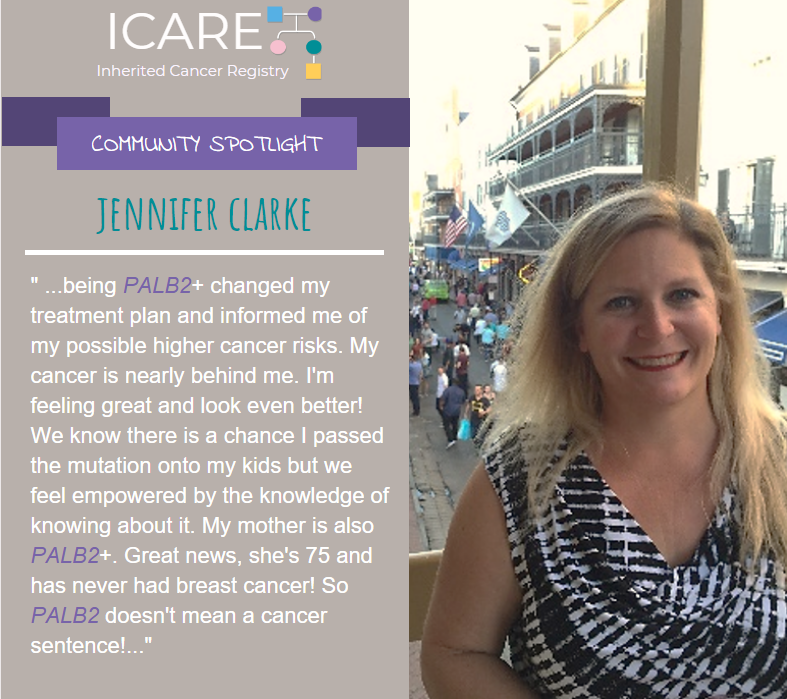 I was diagnosed with breast cancer in December 2018 and was found to be PALB2+. The PALB2 gene had not been tested for when my older sister was diagnosed with breast cancer and had genetic testing done four years earlier. This was new! My cancer was very similar to my sister’s, but being PALB2+ changed my treatment plan and informed me of my possible higher cancer risks for recurrence and other cancers. Like my sister, I had one small tumor in one breast. I could have just had a lumpectomy with radiation and chemo (depending on ONCA result) followed by oral medication, and then just live with a risk of recurrence. The treatment option was a skin saving, nipple sparing bilateral mastectomy with FLAP reconstruction followed by 5-10 years of oral medication. This would have reduced my risk of recurrence to below 10%. It was a no brainer for me — I chose the latter. After my breast surgery, I was then told PALB2 was linked to ovarian cancer, so I started seeing a high-risk gynecologist. After months of discussions with my gynecologist and oncologist, I decided to have an oophorectomy. This was prompted by my PALB2 risk and my adverse reaction to Tamoxifen. The only way to get off the Tamoxifen was to put me into menopause by removing my ovaries, which at the same time, would lower my ovarian cancer risks. Again, this was a no brainer. It’s two years after my diagnosis, and I’m in a really good place. My cancer is nearly behind me, as I don’t think about it on a daily basis. I’m feeling great and look even better 😉 My energy levels are back to normal, I’m playing competitive tennis, and I’m spending time with my family traveling and enjoying life. We look to the future with positivity. We know there is a chance that I have passed the mutation onto my three kids but we feel empowered by the knowledge of knowing about it, and we will test them for it when they get older. My family is empowered too. We recently found out that my mother is PALB2+. Great news, she’s 75 years old and has never had breast cancer! So PALB2 doesn’t necessarily mean a cancer sentence! I have personally known many family and friends diagnosed with breast cancer; my best friend being one who was diagnosed 8 years ago with stage 4, triple positive, metastatic inflammatory breast cancer. She has had radiation, chemo, had her spine rebuilt, and been on numerous clinical trials. She is here today, and her tumor has shrunk by 67%. What I learned from her: “Always have a note taker with you at EVERY appointment because there is always too much info to absorb. Don’t ever give up and never let it define you. Fight your battle your way. And when you need it, ask for help.”
I was diagnosed with breast cancer in December 2018 and was found to be PALB2+. The PALB2 gene had not been tested for when my older sister was diagnosed with breast cancer and had genetic testing done four years earlier. This was new! My cancer was very similar to my sister’s, but being PALB2+ changed my treatment plan and informed me of my possible higher cancer risks for recurrence and other cancers. Like my sister, I had one small tumor in one breast. I could have just had a lumpectomy with radiation and chemo (depending on ONCA result) followed by oral medication, and then just live with a risk of recurrence. The treatment option was a skin saving, nipple sparing bilateral mastectomy with FLAP reconstruction followed by 5-10 years of oral medication. This would have reduced my risk of recurrence to below 10%. It was a no brainer for me — I chose the latter. After my breast surgery, I was then told PALB2 was linked to ovarian cancer, so I started seeing a high-risk gynecologist. After months of discussions with my gynecologist and oncologist, I decided to have an oophorectomy. This was prompted by my PALB2 risk and my adverse reaction to Tamoxifen. The only way to get off the Tamoxifen was to put me into menopause by removing my ovaries, which at the same time, would lower my ovarian cancer risks. Again, this was a no brainer. It’s two years after my diagnosis, and I’m in a really good place. My cancer is nearly behind me, as I don’t think about it on a daily basis. I’m feeling great and look even better 😉 My energy levels are back to normal, I’m playing competitive tennis, and I’m spending time with my family traveling and enjoying life. We look to the future with positivity. We know there is a chance that I have passed the mutation onto my three kids but we feel empowered by the knowledge of knowing about it, and we will test them for it when they get older. My family is empowered too. We recently found out that my mother is PALB2+. Great news, she’s 75 years old and has never had breast cancer! So PALB2 doesn’t necessarily mean a cancer sentence! I have personally known many family and friends diagnosed with breast cancer; my best friend being one who was diagnosed 8 years ago with stage 4, triple positive, metastatic inflammatory breast cancer. She has had radiation, chemo, had her spine rebuilt, and been on numerous clinical trials. She is here today, and her tumor has shrunk by 67%. What I learned from her: “Always have a note taker with you at EVERY appointment because there is always too much info to absorb. Don’t ever give up and never let it define you. Fight your battle your way. And when you need it, ask for help.”
– ICARE Participant, Jennifer Clarke from New Orleans, LA
